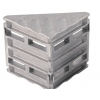Defining transport insurance
Insurance is an agreement by which the insurers become liable, whilst the policy holder pay(s) a premium, to indemnify him (them) or the carrier(s) of an order in the case that a damage is suffered due to an accidental event called risk and which is covered in the aforementioned agreement.
The different components
The insurer : insurance company or underwriting agent with power in the name of one or more companies and/or insurers-underwriters at Lloyd's.
The reinsurer : company or underwriting group acting on behalf of several companies and who insures the insurers.
The policy holder : person or legal person who will receive compensation in the case of an accident covered by the underwritten policy.
The broker : the insurance broker gives the policy holder advice and negotiates with the insurers. His role is first and foremost to protect the interests of the holder. He will set up the insurance policy after having negotiated the terms and conditions with the holder. The broker will be in charge of all communications between the insurers and the policy holder and will deal with the payment of premiums and claims. In an international context, the major brokering groups are able to provide a service on all five continents. This major logistical situation allows both multinationals and SMEs facilities which ensure protection in all their commercial operations.
Choosing the insurer
Regarding transport insurance, the firm can contact:
1. an insurance company in its own country;
2. an insurance agent, representing an insurance company;
3. a broker, who represents his clients in dealing with insurance companies;
4. its forwarding agent.
The insurance broker is probably the most advisable solution for SMEs, whose interests will probably be better served by this type of intermediary.
Laws concerning importing into certain countries (most often in Africa and South America) may necessitate the underwriting of a transport insurance policy with a company from the country. This is also the case in Eastern Europe. However, considering the recent political changes, major changes can be expected in the years to come. It is therefore wise to check on the extent of the guaranties given by these countries and on the risks of non-compensation according to the contract.
Cost of the insurance
Buyers and sellers, depending on the chosen incoterm, are free to underwrite an insurance or not, except with certain destinations where insurance is compulsory.
The average cost of insurance varies between 1,1 % and 2% of the transport's cost, apart for certain journeys to developing countries where the cost of the insurance can reach 8% of the transport cost.
The cost of the insurance depends on :
1. the type of goods (fragile, perishable, hazardous, ...);
2. the quality of the packing and labelling;
3. the method of transport (e.g., " air " insurance is cheaper than " sea " insurance);
4. the route and the destination;
5. the chosen guarantee.
In case of transport by sea or air, the insurance premium is calculated on the base of the insured value. The insured value determines the limit of the compensation in case of an accident. It usually corresponds to the cost of the goods at their destination (CIF goods) increased by 10 to 20 % (in order to include the expected profit or the costs of a new consignment).
Guarantees
Typically, insurance covers the goods from departure to arrival. This general coverage renders underwriting separate insurance policies for each mode of transport unnecessary.
Policies cover all types of goods, yet not the transport itself. Insurance policies regularly define the risks covered and excluded risks as well as certain guidelines regarding operations.
Here is an example: you export goods which have a high risk of corrosion. In view of the fact that seawater contains salt, your goods could be affected by the sea spray. In such conditions, you have to notify your insurer of this characteristic of the goods, so that he can add a specific clause in your
insurance policy. In addition, risks of war, strikes and riots remain at the holder's expense unless there is an expressed agreement.
Policies
Depending on the type of risk
1. The policy " free of particular average " (marine transport - FPA) is the basic guarantee required from a CIF sale. It covers general average.
2. The policy "with particular average" (marine transport - " WPA ") or " specific accidents" (terrestrial transport ) covers restricted damages stated on the policy, and therefore proof of responsibility of the policy holder. The policy" WPA " always covers general and particular average.
3. "Comprehensive" insurance covers any risk that isn't expressively excluded by the policy. It automatically excludes theft.
4. The policy "risk of war or similar" specifically covers war or terrorism.
Depending on the frequency of delivery
1. Voyage policy : covers a trip, for a specific value and destination. It is underwritten for each delivery.
2. Serial policy : it covers a determined quantity of the same kind of goods over several dispatches during an undetermined period. The policy holder informs the insurer of each delivery with a " policy note ".
3. Floating policy : it covers all the deliveries of an exporter whatever the goods, their quantity, their destination and the transport, over a fixed period. The insurer will automatically cover the declared imports or exports, at the premium rates and under the insurance conditions agreed in the open policy, even if there is a late declaration or an involuntary omission.
Depending on the underwriter
Forwarder’s open cover : The shipper asks his carrier or forwarding agent to underwrite an insurance for him. This policy works in the same way as the open policies.





